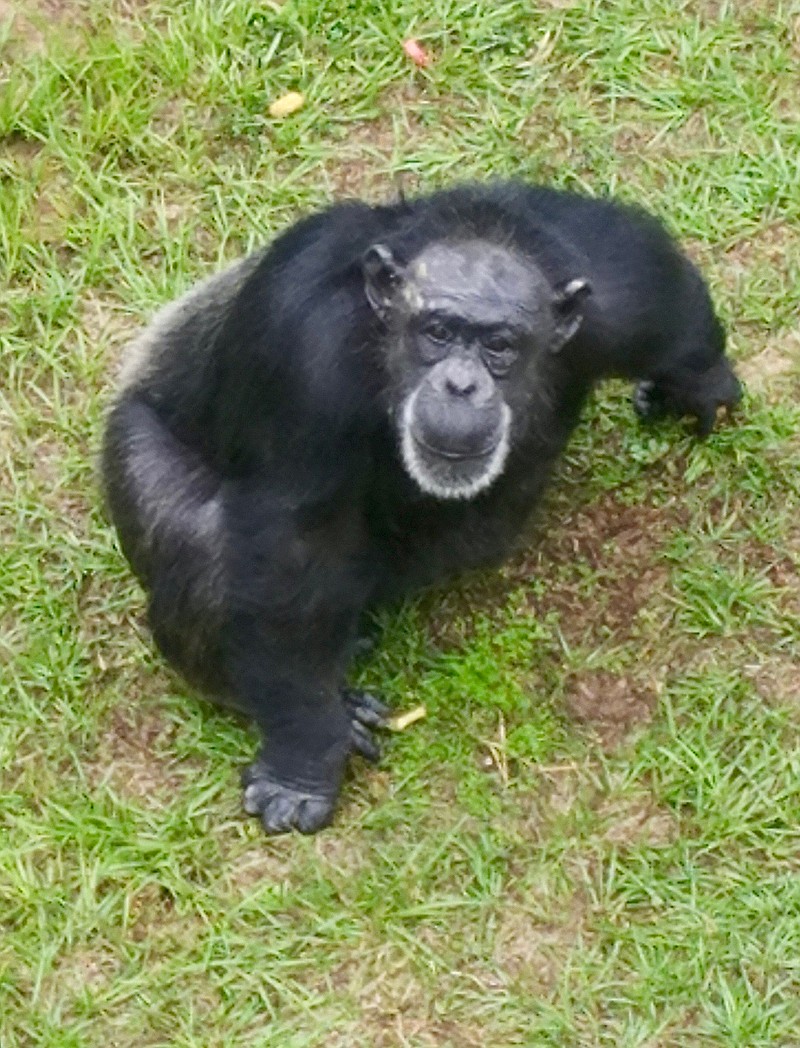KEITHVILLE, La.-Everyone deserves a comfortable retirement, and the chimpanzees who call Chimp Haven home perhaps deserve it more than most.
Many of these 260 chimps served time in a job they certainly didn't volunteer to perform as participants in biomedical research for hepatitis and HIV. The federal government even bred chimps to do the job, but their use in such research later fell out of favor.
The National Institutes of Health eventually retired all but a handful of the chimps, and Chimp Haven was constructed in these woods just south of Shreveport to be their new, 200-acre home, where a chimp can be a chimp and their human friends champion their cause.
Relationships built on mutual respect have been forged here between these chimps and their caretakers (more than 40 are employed in this work) since the first two, Teresa and Rita, arrived at the sanctuary in 2005.
Anyone lucky enough to tour the sanctuary and meet the dozens upon dozens of chimps at Chimp Haven may marvel at the chimps' freedom to roam and relax, display their boisterous energy and just be themselves, living large in a 100-percent-chimp manner.
Such winning qualities of retirement living were evident on a recent drizzly fall morning at Chimp Haven. As part of a tour given to travel writers, animal caregiver Bre Bain talked about the chimp diet and tossed food from a high perch down to several of these retirees in a natural habitat of grass and trees.
Chimps sleep indoors but spend their days in open-air enclosures of all sorts that give them as much freedom as they can be safely granted. On this morning, they received their main meal, a mixture of food. That's followed by an afternoon meal and then more carrots or celery later.
"Julius, want a banana? Here you go, bubba," Bain called to one chimp, the alpha of his family.
According to his bio, Julius was born in the wild but later taken to the U.S. to be part of biomedical research. He indicates a readiness for food by making raspberry noises.
The chimps this morning were situated in one of the three forested habitats at Chimp Haven. It was the smallest, just over an acre, Bain said. Others are five and three acres. Where a chimp hangs out here specifically depends on several factors, such as their personality and health.
"And then we also have a lot of other different types of enclosures because the chimpanzees are all different. So some of them require different needs. Some of them don't really like the open, forested areas. It makes them a little uncomfortable. It's not something they're too familiar with or they won't really utilize it, so they feel much more comfortable in our play yards, our open-top play yards," Bain said. They may prefer courtyards with a jungle gym, for example.
For medical reasons, too, some can't be out in this habitat. "We need to be able to readily access them," Bain said. Some chimp residents have had diabetes and were glucose and insulin trained. They are checked a couple of times a day.
Caregivers meet their needs, cleaning the bedrooms and various habitats.
"Making sure that they're getting all their food. We do health checks every four to six hours," Bain said. "Around the clock, so we have night staff here who's here to take care of them." Caregivers help the vet staff, too.
Because respect is afforded these chimps, caretaker work with them is guided by positive reinforcement, which was practiced this morning with three chimp residents in another enclosure: Keeli, Emma and Sheba.
During this session, the personality of each one came through in the short visit. Having visitors inspired ways to gain their attention. Keeli, in particular, put his enthusiastic personality on full display by romping and running around. He's 21 years old, and his bio notes that he's often pulling a blanket around with him.
That's one way to greet a visitor as a chimpanzee. Another way came from Henry, an alpha who, as visitors sped by in golf cart, just gazed curiously from his perch. He used to be a pet, locked up in a garage for 15 years, according to the sanctuary's website. Now he's the alpha in his Chimp Haven family, healthy and happy.
Bain explained that staff get to know the chimps and socialize with them. But much of the time, they clean and provide food: the basics in life, no matter what species you are. Chimp Haven's belief is that humans and chimpanzees certainly are not much different than each other.
"But most of our day is spent cleaning up after these guys, so we're like their personal maids and chefs," Bain said, appearing to relish the job.
"They get enrichment every single day," Bain said. "Enrichment is anything that is going to provide a mental or physical stimulus, so it could be anything from different scents to maybe some sprinkled spices on their food or even different, novel food items."
Chimps get the typical fruits and vegetables, but they also eat pomegranates and pumpkins. "Different types of squash," Bain said. They get a forage mix twice a week. It might include sunflower seeds and cereal scatted in the chimp's bedding.
"The habitats are great because all of this vegetation out here is actually edible," Bain said. Raisin boards give chimps a challenge to fish the raisins out of the board. It's another way they stay stimulated.
As well, self-determination for chimps remains a guiding philosophy here. Chimp Haven is a place where the remarkable friendships possible between animals and humans can flourish, judging by the enthusiasm of those who work with these chimps and the positive chimp energy the sanctuary residents appear to enjoy.
Although the total chimp population presently stands at 260, Chimp Haven is preparing to admit hundreds more residents to this cozy home in the forest. As such, work is ongoing for this expansion.
"In 2015, the National Institutes of Health (NIH) ended federally funded biomedical research on chimpanzees. As the only designated sanctuary for NIH-owned chimpanzees, Chimp Haven has the great privilege and responsibility to provide a home for the more than 200 additional retired chimpanzees still housed in research facilities. We are eager to bring these chimps into our care, but further expansion is urgently needed so we can welcome them home," said Carrie Jones, communications and development specialist at the sanctuary.
Jones said Chimp Haven aims to complete the project by the middle of next year, but rain may delay the progress.
"In the meantime, we currently have additional space and are welcoming new chimpanzees to the sanctuary regularly," she said. The land for Chimp Haven was originally donated by Caddo Parish.
The public cannot regularly visit the sanctuary. It's a sanctuary, not a zoo. However, Chimpanzee Discovery Days provide chances for the public to see how chimps live their days here. The next one scheduled is Nov. 17 from 9 a.m. to noon. Next year, Chimpanzee Discovery Day dates are March 16, April 13, Oct. 19 and Nov. 16.
Admission charge for those days is $10 or $5 for children between 4 and 12. Behind-the-scenes tours are also available for an additional fee.
For anyone who would like to get involved in supporting Chimp Haven, several options exist: becoming a particular chimp's Best Friend (a symbolic adoption via donation), choosing a donation plan and purchasing items on the Chimp Haven wish list.
(On the Net: ChimpHaven.org.)



